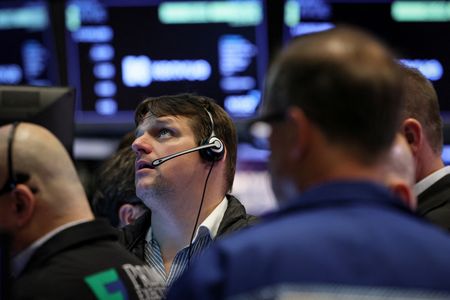
By Shreyashi Sanyal, Shristi Achar A and Carolina Mandl
(Reuters) – The Nasdaq led gains among Wall Street’s main indexes on Wednesday as a slightly lower-than-expected increase in April inflation raised hopes that the Federal Reserve’s interest rate hiking cycle is close to an end.
The Labor Department’s Consumer Price Index (CPI) rose 4.9% in April from a year ago and compared with expectations of a 5% increase. Month-over-month CPI in April rose 0.4% after gaining 0.1% in March.
The lower-than-expected inflation data drove the Nasdaq Composite Index up as much as 1.17% to its highest intraday level in more than eight months.
The Nasdaq sustained its gains in part due to a 3.51% climb in Alphabet Inc as the company rolled out more artificial intelligence for its core search product in response to competition from Microsoft Corp.
“The CPI is indicating some sort of relief in inflationary pressure. That would mean the Fed would be toward the end or already at the end of its interest rate cycle, and growth companies are most heavily affected by higher interest rates,” said Kevin W. Philip, a partner at investment advisor Bel Air.
Growth companies rely more on borrowed money so they benefit from lower rates.
Fed funds futures traders are now pricing in a pause in rate increases at the central bank’s June meeting, and less than a 5% chance of another 25 basis point hike.
“The market is pricing in a Fed cut beginning this summer. While inflation is decelerating, it’s not decelerating at a pace that would justify cutting the Fed funds rate anytime before the fourth quarter of 2023,” said Matthew Palazzolo, senior investment strategist at Bernstein Private Wealth Management.
“There are some fairly encouraging signs underneath the surface when you look at the release. That should be viewed somewhat positively by markets, but muted to a certain extent by some of the risks … most notably the debt ceiling issue.”
Talks on raising the U.S. federal government’s $31.4 trillion debt ceiling entered a new phase on Wednesday as some areas of potential compromise emerged after Tuesday’s White House meeting. The Dow Jones Industrial Average fell 209.53 points, or 0.62%, to 33,352.28, the S&P 500 gained 0.24 points, or 0.01%, to 4,119.41 and the Nasdaq Composite added 77.98 points, or 0.64%, at 12,257.54. The rate-sensitive S&P 500 technology sector index rose 0.82%, while communication services was up 1.21%.
Regional bank shares extended declines from volatile sessions last week on concerns about the sector’s health. PacWest Bancorp lost 2.30%, while Zions Bancorporation inched lower 3.11%.
Oil and gas producer Occidental Petroleum Corp fell 3.32% after its first-quarter earnings fell short of analysts’ estimates. Livent Corp added 4.79% after Australian lithium miner Allkem Ltd agreed to merge with the U.S.-based chemical manufacturing firm to create a $10.6 billion firm. Airbnb Inc lost 10.62% as the vacation rental booking company had fewer bookings and lower average daily rates in the second quarter. Rivian Automotive jumped 3.10% after the electrical vehicle maker beat estimates for its first-quarter results and reiterated its annual production forecast.
Declining issues outnumbered advancers on the NYSE by a 1.17-to-1 ratio; on Nasdaq, a 1.03-to-1 ratio favored advancers.
The S&P 500 posted 14 new 52-week highs and 11 new lows; the Nasdaq Composite recorded 71 new highs and 135 new lows.
(Reporting by Shreyashi Sanyal and Shristi Achar A in Bengaluru; Editing by Anil D’Silva, Arun Koyyur and Richard Chang)

